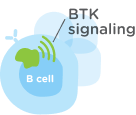Before taking IMBRUVICA®, tell your healthcare provider about all of your medical conditions, including if you:
- have had recent surgery or plan to have surgery. Your healthcare provider may stop IMBRUVICA® for any planned medical, surgical, or dental procedure.
- have bleeding problems or are taking a blood thinner medicine.
- have an infection.
- have or had heart rhythm problems, smoke, or have a medical condition that increases your risk of heart disease, such as high blood pressure, high cholesterol, or diabetes.
- have liver problems.
- are pregnant or plan to become pregnant. IMBRUVICA® can harm your unborn baby. If you are able to become pregnant, your healthcare provider will do a pregnancy test before starting treatment with IMBRUVICA®. Tell your healthcare provider if you are pregnant or think you may be pregnant during treatment with IMBRUVICA®.
- Females who are able to become pregnant should use effective birth control (contraception) during treatment with IMBRUVICA® and for 1 month after the last dose.
- Males with female partners who are able to become pregnant should use effective birth control, such as condoms, during treatment with IMBRUVICA® and for 1 month after the last dose.
- are breastfeeding or plan to breastfeed. Do not breastfeed during treatment with IMBRUVICA® and for 1 week after the last dose.
Tell your healthcare provider about all the medicines you take, including prescription and over-the-counter medicines, vitamins, and herbal supplements. Taking IMBRUVICA® with certain other medicines may affect how IMBRUVICA® works and can cause side effects.
How should I take or give IMBRUVICA®?
- Take or give IMBRUVICA® exactly as your healthcare provider tells you to take or give it.
- Take or give IMBRUVICA® 1 time a day at about the same time each day.
IMBRUVICA® comes as capsules, tablets, and oral suspension.
- If your healthcare provider prescribes IMBRUVICA® capsules or tablets:
- Swallow IMBRUVICA® capsules or tablets whole with a glass of water.
- Do not open, break, or chew IMBRUVICA® capsules.
- Do not cut, crush, or chew IMBRUVICA® tablets.
- If your healthcare provider prescribes IMBRUVICA® oral suspension:
- See the detailed Instructions for Use that comes with IMBRUVICA® oral suspension for information about the correct way to take or give a dose. If you have questions about how to take or give IMBRUVICA® oral suspension, talk to your healthcare provider.
- Do not use if the carton seal is broken or missing.
- If you miss a dose of IMBRUVICA®, take or give it as soon as you remember on the same day. Take or give the next dose of IMBRUVICA® at the regular time on the next day. Do not take or give extra doses of IMBRUVICA® to make up for a missed dose.
- If you take too much IMBRUVICA®, call your healthcare provider or go to the nearest hospital emergency room right away.
What should I avoid while taking IMBRUVICA®?
- You should not drink grapefruit juice, eat grapefruit, or eat Seville oranges (often used in marmalades) during treatment with IMBRUVICA®. These products may increase the amount of IMBRUVICA® in your blood.
What are the possible side effects of IMBRUVICA®?
IMBRUVICA® may cause serious side effects, including:
- Bleeding problems (hemorrhage) are common during treatment with IMBRUVICA® and can also be serious and may lead to death. Your risk of bleeding may increase if you are also taking a blood thinner medicine. Tell your healthcare provider if you have any signs of bleeding, including: blood in your stools or black stools (looks like tar); pink or brown urine; unexpected bleeding, or bleeding that is severe or that you cannot control; vomit blood or vomit looks like coffee grounds; cough up blood or blood clots; increased bruising, or small red or purple spots on the skin; dizziness; weakness; confusion; change in your speech; or a headache that lasts a long time or severe headache.
- Infections can happen during treatment with IMBRUVICA®. These infections can be serious and may lead to death. Tell your healthcare provider right away if you have fever, chills, weakness, confusion, or other signs or symptoms of an infection during treatment with IMBRUVICA®.
- Heart problems. Serious heart rhythm problems (ventricular arrhythmias, atrial fibrillation, and atrial flutter), heart failure and death have happened in people treated with IMBRUVICA®, especially in people who have an infection, an increased risk for heart disease, or have had heart rhythm problems in the past. Your heart function will be checked before and during treatment with IMBRUVICA®. Tell your healthcare provider if you get any symptoms of heart problems, such as: feeling as if your heart is beating fast and irregular; lightheadedness; dizziness; shortness of breath; swelling of the feet, ankles, or legs; chest discomfort; or feeling faint. If you develop any of these symptoms, your healthcare provider may do tests to check your heart and may change your IMBRUVICA® dose.
- High blood pressure (hypertension). New or worsening high blood pressure has happened in people treated with IMBRUVICA®. Your healthcare provider may start you on blood pressure medicine or change current medicines to treat your blood pressure.
- Decrease in blood cell counts. Decreased blood counts (white blood cells, platelets, and red blood cells) are common with IMBRUVICA®, but can also be severe. Your healthcare provider should do monthly blood tests to check your blood counts.
- Second primary cancers. New cancers have happened during treatment with IMBRUVICA®, including cancers of the skin or other organs.
- Liver problems. Liver problems, which may be severe or life-threatening, or lead to death, can happen in people treated with IMBRUVICA®. Your healthcare provider will do blood tests to check your liver before and during treatment with IMBRUVICA®. Tell your healthcare provider or get medical help right away if you have any signs of liver problems, including stomach pain or discomfort, dark-colored urine, or yellow skin and eyes.
- Tumor lysis syndrome (TLS). TLS is caused by the fast breakdown of cancer cells. TLS can cause kidney failure and the need for dialysis treatment, abnormal heart rhythm, seizure, and sometimes death. Your healthcare provider may do blood tests to check you for TLS.
The most common side effects of IMBRUVICA® in adults with B-cell malignancies (CLL/SLL and WM) include low platelet count; diarrhea; tiredness; muscle, bone, and joint pain; low white blood cell count; rash; low red blood cell count (anemia); bruising; and nausea.
The most common side effects of IMBRUVICA® in adults or children 1 year of age and older with cGVHD include tiredness; low red blood cell count (anemia); bruising; diarrhea; low platelet count; muscle, bone, and joint pain; fever; muscle spasms; mouth sores (stomatitis); bleeding; nausea; stomach pain; pneumonia; and headache.
Diarrhea is a common side effect in people who take IMBRUVICA®. Drink plenty of fluids during treatment with IMBRUVICA® to help reduce your risk of losing too much fluid (dehydration) due to diarrhea. Tell your healthcare provider if you have diarrhea that does not go away.
These are not all the possible side effects of IMBRUVICA®. Call your healthcare provider for medical advice about side effects.
You are encouraged to report negative side effects of prescription drugs to the FDA. Visit www.fda.gov/medwatch or call 1-800-FDA-1088.
If you are having difficulty paying for your medicine, AbbVie may be able to help. Visit AbbVie.com/PatientAccessSupport to learn more.








